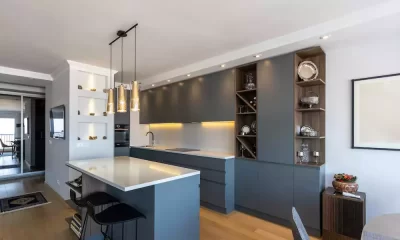Trends
Simple Ways To Use Less Energy At Home

With the increase in remote working and spending more time at home, household energy use has increased.
While there is less wear and tear on office equipment and the use of resources and energy in the workplace, this shift in energy use has increased household energy consumption.
With our properties now accommodating a home office and exercise areas on the off chance we will be locked down again sometime in the future, we’re powering up these spaces with technology, equipment, and facilities.
Utility bills are much higher than they used to be, not due to inefficient appliances but just being at home using heating, air conditioning, hot water, and energy-hungry systems like technology for more hours in the day.
Households can do a lot to manage their usage and reduce expenses through eco-friendly practices.
Reduce Energy Consumption
Cold winters and hot summers don’t make it easy to reduce energy use in the home. However, your home can harness the sun’s power with solar panels and a good storage battery, so the power can be used when needed.
Solar Power
Generating your power using a free resource like wind or solar spurs many a keen environmentalist, but it’s not always economical. There can be a trade-off – saving the planet will cost more in the short term to pay for the solar panels, battery, and installation. Start small if the all-out switch to solar is cost-prohibitive.
Use solar-powered outside lighting, and charge up garden equipment with a solar panel. For the techies, you can even use a solar-powered USB charger for your smartphone and devices.
Choose A Renewable Energy Supplier
Find the power supplier that uses renewable sources to create energy that feeds your home. For example, hydropower and wind power.
Another option is nuclear power, which costs much less and isis more eco-friendly than oil or gas.
Water Conservation
Add a meter to your water supply to understand how much water your home uses. If your usage is unusually high, there may be a leak in a pipe. Check all lines and also, within your home, fix any leaky taps. It’s incredible how much water is wasted due to leaks.
Water Filters
Consider water filters for your kitchen taps – or even your refrigerator water dispenser – so you can access clean, healthy, and safe water without purchasing bottled water. Not only will this save on your plastic usage, but you will also save money in the long term since your water filter will not cost as much as your bottled water consumption.
Plus, using a filter to remove harmful metals, including lead, arsenic, and radium, is better for your health. For our USA readers, discountfilterstore.com is worth visiting, and for everyone else, do a Google local search on ‘affordable water filters’ and your location to get providers in your local area.
LED Light Bulbs
The best way to save power is not to use it! Switch off wall sockets and lights when they are not required, i.e., when you’re not using them. The rule of thumb is to check the light off when leaving the room.
Avoid the ‘stand-by’ mode that’s prevalent with so many tech systems, including your smart TV and kitchen appliances, instead, switch off to save energy.
Also, opt for LED light bulbs instead of regular incandescent bulbs. You may have had a bad experience with LEDs; however, give them another go, as they are much improved than the earlier models.
When they first came out, energy-efficient LED bulbs failed to generate the same glow as regular light bulbs. LEDs are the preferred bulb now, and many more styles, including Phillips Hue.
Insulation
Walls, underfloor, and roof areas should have insulation to reduce heat loss. Windows needs to be double or triple glazing also to minimize heat loss. When adequately insulated, your home can be excellent in summer and warm in winter.
Waste Reduction
Getting a compost bin means that food waste can become compost which is the perfect excuse for you to start growing vegetables, fruit, and herbs because you can use the compost you’ve made from food waste as fertilizer.
You save money, but more importantly, cut down on your plastic waste by opting for home-grown produce instead of purchasing it from the supermarket.
Household food waste bins can be discreetly stored in your kitchen, with filters to ensure no flies can enter the container, and no nasty smells escape!
Recycling
Spend time sorting your recyclables from your general waste. Glass, plastic, and metals can be recycled, which helps reduce your carbon footprint and ensure your home is more environmentally friendly.
Plant Trees
Trees can reduce groundwater loss, so your grass will go. Trees will also add nutrients to the soil for your garden and provide shade.
Avoid cutting down trees; instead, plant more and maintain them so they do not infringe on your neighbor’s enjoyment of their property.
Final Thoughts
There are so many simple and easy changes that you can make to your home, which will benefit both you and the environment in so many different ways. While we can’t change the world alone, we can make a slight difference and set an excellent example for others to follow by changing our habits that impact the environment.
Education and advocacy of environmental awareness is everyone’s responsibility; you, too, can make it yours!






